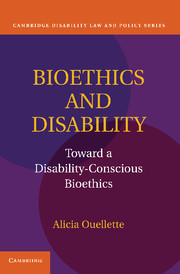7 - The End of Life
Published online by Cambridge University Press: 07 June 2011
Summary
The end of a person's life might come in old age or it might come before. The final moments can be sudden and shocking. They may also be anticipated in the wake of a long illness or the slow degradation of the human body. Medical technology has enabled control over the moment of death in some cases. That control gives rise to questions. When, if ever, is death the best outcome? Who should make decisions about when to use, and when to stop using, technology to extend life? What is the role of surrogate decision making? Under what conditions should the withdrawal of life-sustaining treatment be permitted by surrogate decision makers? And how does the removal of life-sustaining treatment relate to other forms of treatment? Depending on one's perspective, these questions might implicate disability-related concerns including the role of societal perceptions about the worth of people with disabilities in medical decision making.
This chapter presents two cases that arose at the end of a person's life. The first captured the public's attention in a way that few medical decision-making cases do. The death of Theresa Schiavo was a media event. It generated state and federal legislation, garnered the attention of state and federal courts, and was the subject of hundreds of scholarly articles. The second case, that of Sheila Pouliot, was less public but no less important. Both cases raised questions about end-of-life decision-making law and its future.
- Type
- Chapter
- Information
- Bioethics and DisabilityToward a Disability-Conscious Bioethics, pp. 271 - 314Publisher: Cambridge University PressPrint publication year: 2011



